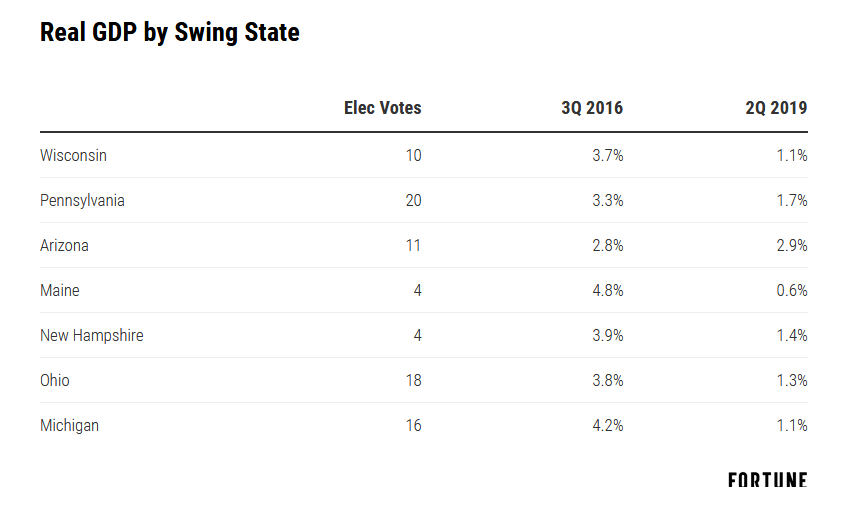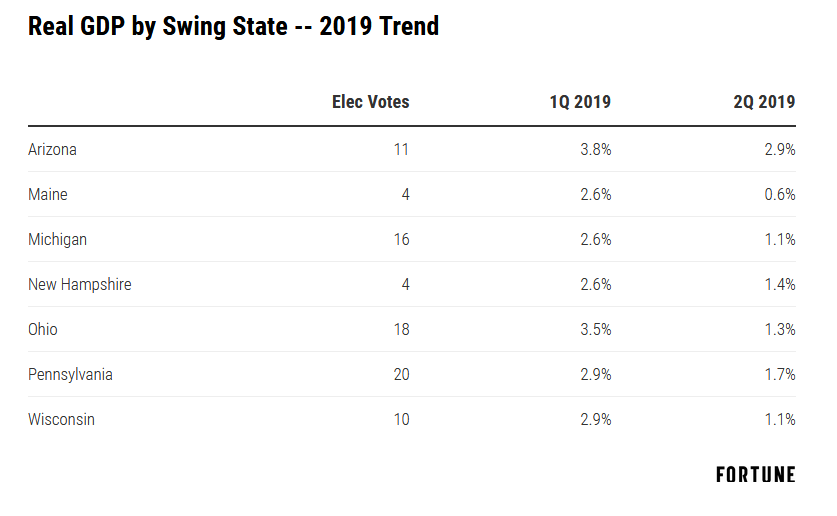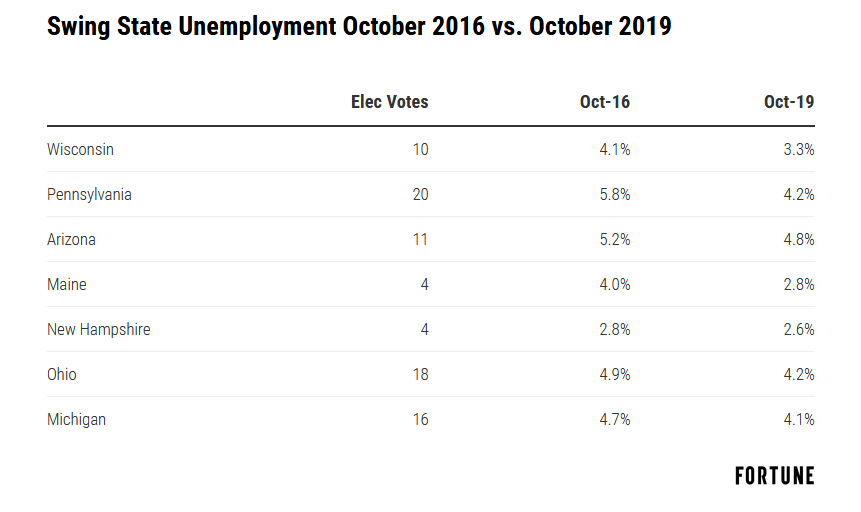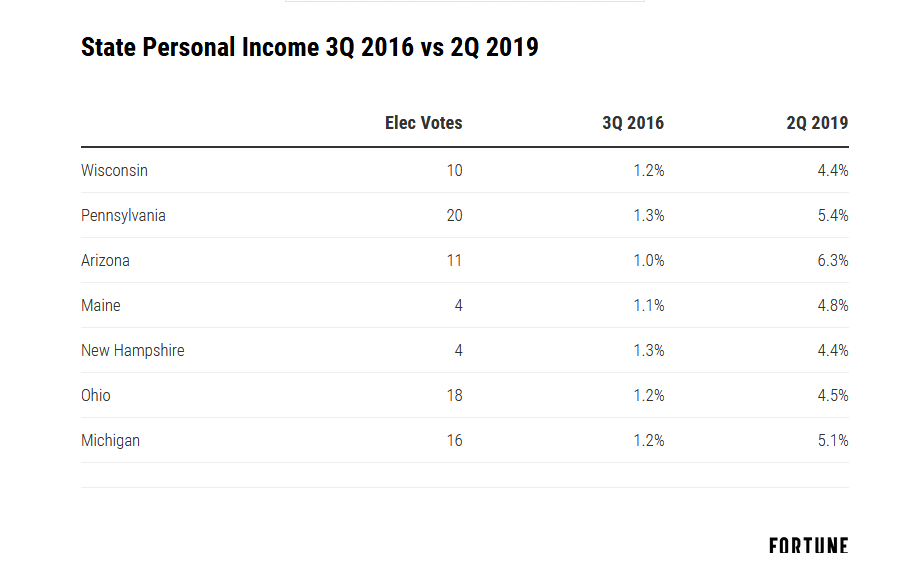这几个摇摆州的经济形势或将决定特朗普能否连任
Bob Sellers | 2019-12-01 21:30
分享:
 [译文]
[译文]

It’s a mixed picture.
When it comes to economic conditions in seven likely 2020 swing states, there’s some bad news, some good news, and more questions than answers about how the economy in those states may swing the election. Three months ago Fortune looked at the economic numbers in seven swing states, and with new data available we ran the numbers again. These states account for 83 electoral votes toward the required 270 to win, and if we learned anything in 2016 it’s that the popular vote doesn’t elect the president, it’s the swing states, stupid. (Thank you, James Carville.)
We’ve updated the data with the latest numbers available, including real GDP from the 2nd quarter (3rd quarter data takes longer to compile at the state level and is not yet available), as well as the aforementioned unemployment rates (October) and personal income growth (2nd quarter). We compared those numbers with the conditions back when the election took place in 2016, in an effort to see if people are better off economically. Three months ago we saw slower growth than in 2016 in all swing states but one (Arizona), and this time, the trend continues.
特朗普的选情乐观吗?这不是一两句话能够说得清的。
在2020年总统大选期间,美国有7个州大概会成为“摇摆州”,说起这些州的经济情况,有一些好消息,也有一些坏消息。至于它们的经济情况是否会对大选产生影响,留给我们的问题远比答案多。三个月前,《财富》杂志对这7个摇摆州的经济数据进行了研究。最近,我们又根据最新数据再次进行了分析。根据美国的选举制度,总统候选人至少要获得270张选举人票才能够当选,而这7个州占了83张选举人票。要说2016年的故事教会了我们什么,那就是美国总统并不是全国老百姓普选出来的,真正在大选中起决定作用的,恰恰是这些摇摆州的倒向。(克林顿的智囊詹姆斯·卡维尔当年在辅佐克林顿竞选时,曾经发出过一句振聋发聩之语:“笨蛋,最重要的是经济。”)
我们对研究的数据进行了更新,包括实际GDP(这里采用的是第二季度的数据,因为各州的第三季度数据还需要一些时间才能出来,所以目前无法获得)、失业率(10月数据)和个人收入增长率(第二季度数据)等。我们把这些数据与2016年大选刚刚开始时做了一番对比,以观察人们的经济状况是否有所改善。三个月前,我们发现除了亚利桑那州之外,所有摇摆州的经济增长率都比2016年慢。这次对数据更新后,我们发现,这种趋势还在持续。

“I think the comparison to the last election is not that relevant,” says Jim Paulsen, Chief Investment Strategist of The Leuthold Group. “I think what matters most is whether data is getting weaker in recent quarters or not compared to what it was earlier.” That view shows the overall U.S. economy continuing to slow from the 1st quarter to the 2nd quarter of 2019.
Leuthold Group的首席投资策略师吉姆·保尔森表示:“我认为,把这次选举与上次选举进行比较没有太大意义。当下最值得关注的是,最近几个季度的数据跟之前相比是否变弱了。”而从2019年一季度到二季度,美国的总体经济增长率仍然在持续放缓。

Larry Sabato, founder and director of the University of Virginia Center for Politics, doesn’t think the economy is the primary motivator today as it was back when Bill Clinton was running. “It takes a great deal to shake a voter’s partisanship these days. Donald Trump is the main reason why. You either love him or hate him, and it would take a lot for a Trump backer to change sides because his or her family’s income declines, or an anti-Trump voter declare for Trump because the economy appears strong.”
While the swing state economies may be slowing, President Trump may find some good news in other trends. Unemployment has fallen in all of the swing states. If the question is, “Do you have a job?” more people can answer “yes.”
弗吉尼亚大学政治中心创始人、主任拉里·萨巴托则认为,与克林顿时代相比,现在的美国,经济问题已经不再是决定谁能够胜选的主要因素。“现在要想让一个选民改变他的党派倾向是很难的,造成这种局面的主要原因就是特朗普。大家要么爱他爱得要死,要么恨他恨得要命。一个特朗普的支持者,就算是他的家庭收入下降了,他也不太可能放弃对特朗普的支持。而一个反对特朗普的选民,也不太可能因为经济增长了,就改变自己的立场。”
虽然各个摇摆州的经济可能都在放缓,但特朗普可以在其他趋势中发现一些好消息——特朗普上台这四年,所有摇摆州的失业率都下降了。如果你随便在街上问问别人:“你有工作吗?”可能更多的人会回答:“有”。

In addition, state personal income showed a strong bump last quarter, especially compared to the 3rd quarter of 2016, which led up to the last presidential election. That may explain why consumers are extending the current expansion, and may create a sense of economic well-being among swing state voters.
另外,上季度,各州的个人收入增长较为强劲,尤其是与2016年第三季度相比——上次美国大选也是在这时开始的。这可能也解释了为什么美国的消费行为还在继续走强,而且这多少也能够在摇摆州的选民中营造一种经济上的幸福感。

What we don’t know, though, is whether the falling growth rate in the swing state economies will eventually lead to layoffs and job losses, which could turn the positive trend in income growth into a negative one.
What we do know is that Mr. Trump likes to talk about overseeing “the greatest economy in the history of our nation.” Leaving aside any argument for or against that statement, it underscores how important he believes the performance of the economy will be toward his 2020 reelection campaign.
Ronald Reagan asked the question in 1980, “Are you better off today than you were four years ago?” Most people answered “no” and elected him to replace President Jimmy Carter in the Oval Office. But Professor Sabato says that history shows there are times when the economy is not the determining factor. “The economy was very solid in 1968 and Hubert Humphrey should have won easily—but Vietnam was of much greater concern than the economy. In 2000 the tech economy was still booming, but Al Gore couldn’t fully capitalize because of Clinton’s scandals.” So despite the legendary quote from James Carville, in this politically polarized era, it may not be the economy, stupid. As the president likes to say, “We’ll see.”
不过我们目前无法预测的是,摇摆州的经济增长率下降,是否会最终导致大量裁员和失业,进而将人均收入增长的积极趋势扭转为消极趋势。
我们知道,特朗普很喜欢自吹“美国经济正处于历史上最好的时期”。且不说这番话是否经得起推敲,这至少表明,他认为美国经济的表现对他2020年能否连任是至关重要的。
美国前总统里根1980年曾经问过这样一个问题:“你现在的日子比四年前过得好吗?”多数人回答:“没有”,然后人们便把里根选上了台,换掉了卡特总统。不过萨巴托也表示,历史表明,有时经济并非总统大选的决定性因素。“1968年,美国的经济形势非常稳定,休伯特·汉弗莱本来可以轻松取胜,但比起经济问题,当时人们更关心的是越战。2000年的时候,科技经济仍然在蓬勃发展,但由于克林顿丑闻的缘故,阿尔·戈尔没能把握住那次机会。”所以虽然詹姆斯·卡维尔说过那句名言(“笨蛋,最重要的是经济”),但在这个政治两极分化的时代,经济或许已经不是最重要的了。至于特朗普是否有可能再干一届——就像他的那句口头禅:“我们等着看吧。”(财富中文网)
译者:朴成奎
相关阅读:



